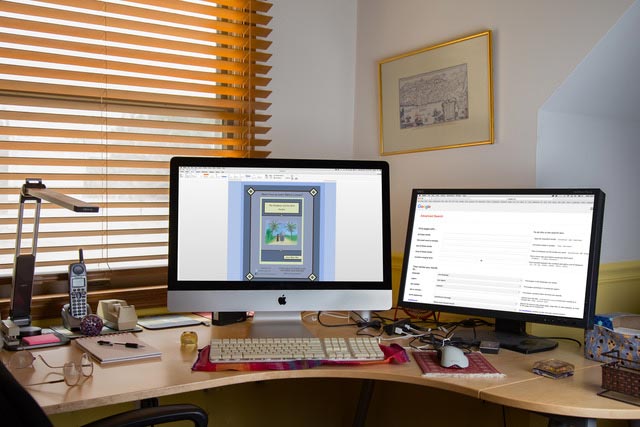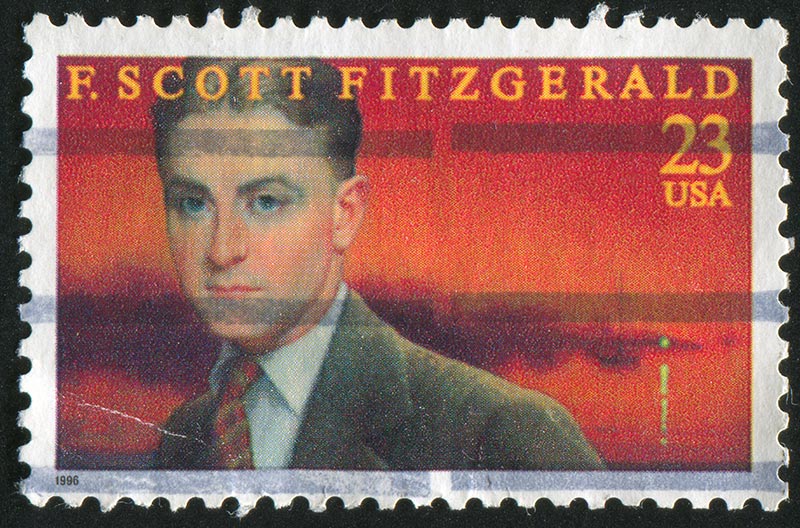They stood inside the broken iron gate and looked at the stones. Many lay rigid on the ground, but others projected upward: some straight, some listing at bizarre angles.
“They’re here,” he said. “All of them.”
“Really.”
“Yep—F. Scott, Zelda, and Scottie, too.”
“But you don’t know where, do you?”
He smiled. “It’s a good thing I married you. You keep me—grounded.”
“Very funny. So, you dragged me here on my lunch hour to go rummaging around a graveyard? The heat is ruining my suit. I’ll be a rag by the time I get back to the office.”
“Come on, it won’t take long. How hard can it be? There’s not that many here. Look—there’s a path and a roped-off area at the end. That must be where they are.”
He strode forward with confidence, and she followed, but when they reached the end of the path the gravestones were nowhere to be seen.
Ashley sighed and walked up to the cemetery’s sole tree, a wizened oak whose long branches stretched outward like twisted arms. “Okay, we’ll divide it up. You take that side, and I’ll take this.”
He was relieved when, a few minutes later, he heard her call out, “Found them! Over here.” He hurried over to her.
She stood in front of a small group of headstones. F. Scott and Zelda were in the back, their daughter Frances in the front, and three other Fitzgeralds, whom he could not account for, were off to the right. The markers were set haphazardly, and crabgrass sprouted around them, forming jagged islands of pale green in the hard soil.
‘I live in the angle of a leaden wall,’ he thought. Thoreau.
“It’s not much, is it? You’d think that the church would do more to keep it up. Surely they could make it into a decent tourist attraction—you know, put up some signs, sell some books in the lobby. Maybe they could arrange readings. There are always people who are willing to pay for that sort of thing—literary tourists.”
He did not reply. The little yard in which they stood was filled with headstones. There was no room for expansion. The area was hemmed in by office buildings and roads. Just beyond its black fence cars and people rushed by, overheated and oblivious. Across the highway, a large glass building was going up. A “For Lease” sign dangled from a crane.
“It isn’t what you expected, is it?”
“No.” He glanced around, half-fearing to see someone from the church coming out to talk to them. But there was no one in the cemetery: just a laborer bent over in a corner of the graveyard, trying to straighten a marker that had shifted; and a tiny elderly woman, in a thin embroidered vest, who had just entered. She gripped a canvas bag imprinted with pastel flowers in both hands. She did not look up when she passed them.
He wondered if anyone still embroidered.
“You know, people don’t have lives like that anymore.”
“What?” Ashley’s question startled him.
“All the reckless parties, the wildness. When was the last time you heard of someone jumping into a fountain?”
“Not lately.” He tried to imagine the lady in the vest jumping into a fountain and could not. Instead, his thoughts wandered to his grandmother. She always planted a vegetable garden in the back of her house. She liked to pick string beans, and bring them onto the back porch and string and cut them with her knife in an old, tin pan. The porch was filled with pots of nasturtiums, and Virginia creeper trailed along the railing, and in the evening, sometimes, you could hear cicadas. It had been years since he had seen her.
“…wasting their lives. Are you listening to me?”
He hung his head. “Sorry. I drifted off there for a minute.”
She stared at him. “Writers. Fitzgerald, Hemingway and the rest—the drunks, the crack-ups, the suicides—do you think at the end they thought it was worth it?”
“I don’t know.”
“Well, they ruined their lives and the lives of everyone around them. That should tell you something.”
“He wrote some beautiful prose, Ash. Some of the best of all time.”
“Yes—I’ve heard that lecture before. I could probably quote it to you by now. So why don’t you try to do something with—” She swept her hand over the Fitzgeralds and all the rest of the insensible, unsuspecting dead: struck down, guilty by association.
“I’ve thought about it. But I don’t seem to have …” His voice trailed off.
“I know. You don’t write anything. You just read.” She glanced at her watch. “Listen, I’m sorry, I have to catch the Metro and get back to the office. But this is a good chance to tell you—our plans for Saturday night have changed.”
“Saturday?”
“Please don’t tell me you forgot. We were going to take Derek and his wife out to dinner, remember?”
“Right.”
“Well, that’s all changed now. They prefer to dine in—they’re coming to our place instead and I’m cooking a meal.”
“Are you sure you want to do that?” He tried to hide the note of alarm in his voice.
She laughed and tossed her head. “Don’t worry, I’ll figure out the food side of it. I can always order something in; they’ll never know the difference. But what I need to tell you is that I arranged with our building super to give us some temporary space in the basement to store our boxes. He’s going to have one of his guys start moving them today. He may be there when you get home so don’t be surprised. And please don’t forget to tip him.”
“Boxes? The ones with my books?”
“They’ve been sitting in the hallway ever since we moved in. We can’t let the Dereks think that we live in a stockroom.”
“It’s only been three weeks. The Dereks will understand. The box with my signed Faulkner—he’s not moving that, is he?”
“Do you want to do other people’s taxes for the rest of your life? If Derek likes you he’ll give you that position as junior accountant.”
“Why are you so sure?”
“What do you mean?”
“There are plenty of people who want that job. There’s no reason he should hire me.”
“Of course he will! As long as we don’t do anything to spoil it.”
Her cell phone rang and she stepped away to answer it. When she turned back to him she was frowning. “I have got to go. Something’s come up at the office and they want everyone there for a meeting at one-thirty.”
He followed as she hurried back toward the gate. A trail of people was filing out of the church. The doors and windows were wide open, and people were talking to each other and fanning themselves.
Ashley halted. “We better let that group go ahead of us. You know how pushy tourists can be.”
Ben looked at her. “That isn’t a tour group. They’re worshippers. That was the noon mass.”
“Oh.” As soon as the group broke up, Ashley jogged down the steps and turned for the Metro station. She smiled brilliantly. “See you tonight!”
He watched her go.
An older man had detached himself from the departing worshippers and had started back up the driveway. Seeing Ben standing alone at the church entrance, he waved in apology, “I forgot my cane. That’s what old age will do to you.”
“That’s quite all right, Sir,” Ben replied. And added, “I’m sure that it’s still inside where you left it.”
Crepe myrtle bloomed along the church walls and the fragrance was strong. He again thought of his grandmother. He doubted that he could remember her perfume—or if she even wore any. Was there crepe myrtle in her front yard? He wondered if a fragrance could be a memory. His mother had once told him that his grandmother had lived “a narrow life.” But, then again, they had never gotten along.
He looked back at the graveyard, knowing he would never return. The woman wearing the embroidered vest had walked over to the Fitzgeralds’ monuments. She must have been waiting for Ashley and him to leave. He watched as she took something from her bag and laid it on the author’s grave. She stayed there for a few moments, a quiet figure, standing in the sunshine and the heat. Then she turned to leave.
He ducked behind the side of the church and waited until she had reached the parking lot. Then he went back into the cemetery and looked at the object in front of the tombstone.
It was a copy of This Side of Paradise. The jacket had been torn, and the title reduced to This Side.
He did not know how long he stood there. But slowly, the sounds of the highway, and of Latin music from the construction site across the street, led him back to the present.
You know, people don’t have lives like that anymore.
He began running, through the gate down the steps and onto the sidewalk. Traffic was jammed and almost completely stopped when he started across the lanes. He was already in the middle of the highway when someone yelled, “What do you think you’re doing, Mister? We got a green light here!”
Ben saw the taxi driver and the empty taxi and dove inside. “Thanks, old sport! Dulles, and step on it! I have to catch a plane!”
The cabbie looked in the rear-view mirror. He was about to say something, but when he saw the young man laughing, he smiled instead, and together they drove off, leaving the graveyard behind.

Photo by David Illig
Leona Upton Illig is a book critic for the Children’s Literature Company, LLC, whose book reviews are distributed to libraries and schools around the nation. Her short stories have been published in magazines such as The MacGuffin, The North Atlantic Review, and The Western Online, while her non-fiction has been published in Sky and Telescope, the premier astronomy magazine in the United States. Her children’s chapter book, The Elephant and the Bird Feeder, was published by 1st Ride Enterprises in 2016. From living in Thailand and Laos, as well as in several countries in the Middle East, Leona developed a deep appreciation for the customs and cultures of other countries. She holds an Associate’s Degree in Elementary Education from Anne Arundel Community College and a Master’s Degree in English Literature from the University of Maryland, College Park. A member of The Society of Children’s Book Writers and Illustrators, the Maryland Writers’ Association, and the Eastern Shore Writers’ Association, she currently lives between Baltimore and Annapolis with her husband, David, and a small spaniel named Clara. Further details can be found at her website, http://leonawrites.wordpress.com.

Photo by David Illig
5 Questions with Leona Upton Illig:
TD: Tell us a little about this story? Where did the idea come from?
LUI: A few years ago my husband and I were in Rockville, about an hour’s drive from our house, and we decided to stop and visit Fitzgerald’s gravesite. It was pretty much as I described in the story: small, a little sad, and sandwiched between busy roads, businesses, and apartments. It started me thinking about the lives that famous, and not-so-famous, people live, and from then on the story almost wrote itself.
TD: Who is your greatest influence?
LUI: My greatest writing influences were my teachers, starting with elementary school and all through college. Their guidance and advice were invaluable. As far as writers go, I would have to say that I probably learned the most about writing from reading Shakespeare’s plays and Charles Dickens’ novels.
TD: What is your favorite place to write and why?
LUI: I have two favorite places. The first is a desk upstairs in the front spare bedroom where it is quiet. I use two computer screens: one big one for the story I am writing, and a smaller one for doing research. I like to keep the story and the research separate, and the uncluttered feel of it makes for a good writing atmosphere. I use an Apple Macintosh computer because I have never found anything easier to use, or better, for writing. I also use a program called Scrivener which is really nice, especially if you need to organize a lot of information for a novel. My second favorite place is in a big chair in the living room, with my dog, and often with a baseball game playing on TV. That’s where I work on revisions, or additional research, using my iPad and often a copy of the printed manuscript. Something about being in the middle of activity inspires me to get things done!
TD: Do you hand write your work or go directly to the keyboard?
LUI: I usually go right to the keyboard (the computer or my iPad), but, I do write down notes on stickies or pads once in a while. And I always print out a copy of my manuscript to proofread before I send it in—I find that I often find errors in the printed copy that I missed when reading it on the computer.
TD: What book would you want on a desert island?
LUI: I would probably take Tinker Tailor Soldier Spy by John le Carre. Every time I read it, I find something new and delightful in it. He is surely one of the great novelists of our time.



COMMENTS ARE OFF THIS POST